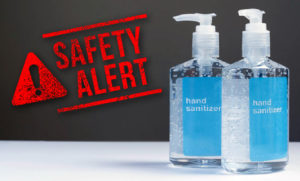Dangerous findings have prompted the FDA to start a hand sanitizer “DO NOT BUY” list.

The Food and Drug Administration (“FDA“) continues to discover Methanol in more hand sanitizers as the COVID-19 pandemic progresses. Methanol is a wood alcohol that is toxic to humans and potentially fatal. It is not an acceptable ingredient for hand sanitizers and should not be used due to its harmful effects.
Methanol Dangers
The FDA states that “Methanol exposure can result in nausea, vomiting, headache, blurred vision, even permanent blindness, seizures, coma, permanent damage to the nervous system or death. Anyone using these products on their hands are at risk for methanol poisoning, young children who accidentally ingest these products and adolescents and adults who drink these products as an alcohol (ethanol) substitute, are most at risk.”
Deaths
According to KRQU.com, (https://www.krqe.com/health/coronavirus-new-mexico/new-mexico-dept-of-health-reports-deaths-due-to-methanol-poisoning-from-hand-sanitizer/) three people in New Mexico recently died from methanol poisoning after drinking hand sanitizer containing the toxic chemical. One person became permanently blind from drinking it, and three more are in critical condition.
FDA Warnings
FDA Reiterates Warning About Dangerous Alcohol-Based Hand Sanitizers Containing Methanol
The FDA DO NOT BUY List of dangerous hand sanitizers
Importantly, many of these Methanol containing sanitizers do not even list Methanol as an ingredient on their label.
The FDA also reminds consumers to be vigilant regarding:
- Hand sanitizers that may not contain a sufficient percentage of ethyl alcohol or isopropyl alcohol.
- Hand sanitizers with false, misleading, or unproven claims that they can prevent the spread of viruses such as COVID-19, including claims that they can provide prolonged protection (e.g., for up to 24-hours).
- Products that are fraudulently marketed as “FDA-approved” since there are no hand sanitizers approved by the FDA.
CDC Recommendations
The Centers for Disease Control and Prevention (CDC) recommends consumers use an alcohol-based hand sanitizer that contains at least 60% ethanol (also referred to as ethyl alcohol), when they are unable to hand-wash with soap and water for at least 20 seconds.
Worth Repeating
Every day, we represent consumers who have been harmed by dangerous products. In many cases, those lawsuits have prompted safety changes. However, those changes only occurred after the injuries happened. We believe it is important to try to help prevent injuries and wrongful deaths. So, until there’s a solution to this worrisome problem, Terrell Hogan will continue to repeat information about dangerous products to help keep you informed and safe.

